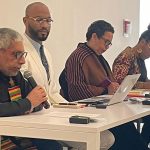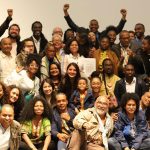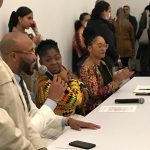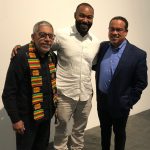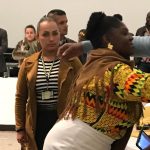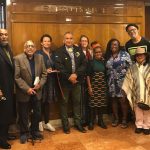The conference was a first for Latin America
Bogota, Colombia – National African American Reparations Commission (NAARC) Administrator Don Rojas delivered the keynote address last week at a Global Reparations session that was part of the Inaugural activities celebrating newly elected President Gustavo Petro and Vice President Francia Márquez Mina.
Marquez Mina is Colombia’s first Afro-Columbian Vice President.
Video: Who is Francia Marquez
Delegates from several countries in Latin America, the Caribbean, Canada, Senegal, Nigeria, France and Ghana were also in attendance. The US delegation included Rojas and NAARC Commissioner and Howard University Law Professor Justin Hansford. Minnesota Attorney General Keith Ellison, and Jesse Jackson, Jr. were among the invited guests attending the conference.
Present at the inaugural ceremonies were several Latin American presidents and vice presidents, as well as the Prime Minister of Guyana.
“The inauguration ceremony was very impressive, with lots of pomp and circumstance,” said Rojas, who also represented the New York-based Institute of the Black World 21st Century (IBW). “But, most significantly, it was the first such ceremony in the history of the country that was conducted in the open, in Bogota’s central plaza, where hundreds of thousands of ordinary Colombian citizens were able to witness the swearing in of President Gustavo Petro and Vice President Francia Marquez Mina.”
Coming just days after the historic reparations summit in Accra, Ghana, the Bogota meeting added further momentum to the growing global reparations movement.
During his presentation, Rojas spoke about the evolution of the global movement within the past 10 years and he referenced the speech by Ghana’s President Nana Akufo-Addo at the historic reparations summit in Accra a few days before the Bogota conference, in which he called for reparations for the entire continent of Africa for the harms caused by European colonialism and the Trans-Atlantic Slave Trade.
Rojas also referenced a recent meeting of global reparations leaders with Vatican officials to address the role of the Roman Catholic Church in the transatlantic slave trade. At that meeting, the reparations leaders recommended steps the Vatican can take to help the descendants of enslaved Africans achieve justice and repair.
Representatives of the other delegations in Bogota also reported from their respective national perspectives on the local work being done toward reparative justice.
Vice President Marquez Mina made a brief presentation at the end of the conference in which she noted the historic significance of the gathering and announced that she will be leading a new Ministry of Equality, which will include a reparations portfolio. She also stated that the new government will soon be establishing a national reparations commission within her ministry.
Images from conference
- August 2022, Bogota, Colombia
- August 2022, Bogota, Colombia
- August 2022, Bogota, Colombia
- (L to R)—Don Rojas, Prof. Justin Hansford (Howard University School of Law) and Keith Ellison, attorney general for the State of Minnesotta, at the Colombia Reparations Conference
- August 2022, Bogota, Colombia
- August 2022, Bogota, Colombia
Presentation by Don Rojas: An Overview of the Global Reparations Movement
Leaders of the Colombia Government-Elect,
Distinguished Guests,
Sisters and Brothers,
Friends and Comrades.
Good afternoon to all. It is my singular honor to speak to you today in my capacity as the Director of Communications and International Relations for the Institute of the Black World 21st century (IBW) and for the National African American Reparations Commission (NAARC), as well as a consultant to the Caribbean Reparations Commission (CRC).
And, I have been asked by the organizers of this gathering to provide a brief overview of the global reparations movement today.
We meet here in Bogota at a propitious moment in the history of our world. Today, we are witnessing the evolution of a global movement for justice and equality, a movement to repair and heal the harms and the wounds of one of history’s greatest crimes against humanity—the transatlantic slave trade and the chattel slavery system which created a Holocaust in which over 15 million innocent Africans perished.
I wish to salute Sis. Esther and Bro. Helmer and their colleagues for organizing this historic gathering here in Bogota. We look forward to the establishment of Colombia’s National Reparations Commission in the not-too-distant future.
We, from the nations of the Caribbean and Latin America share a common history of slavery, colonialism, imperialism and neoliberalism, a history filled with misery and adversity. But we also share a common bond of struggle and resistance to exploitation and oppression, and, to be sure we will share a common destiny as we journey together into the 21st century.
Today, we are witnessing a surge of activity across the world in support of slavery reparations. Reparations is a movement whose time has come. Reparations is not just about our common history. It’s also about our present and our future.
The global reparations movement today is multifaceted. It is expressed in political, social, cultural, economic, educational, and religious manifestations.
In recent weeks reparations has dominated the global headlines from Africa to the Caribbean to Canada even to Australia and New Zealand. We’ve read about Pope Francis’ recent visit to Canada to apologize for crimes committed by the Catholic Church against indigenous peoples in Canada and indigenous leaders have used the Pope’s visit to renew their call for reparations.
We’ve read also about recent statements by members of the British royal family apologizing for Britain’s role in practicing chattel slavery in the Caribbean while opening the door to potential negotiations around reparations for the harms of slavery.
In the United States over 350 civil society organizations, along with 217 members of Congress under the leadership of Congresswoman Sheila Jackson Lee of Houston TX have advanced legislation known as HR40 in the House of Representatives and are calling on the Biden Administration to set-up by executive order a presidential reparations Commission to examine and analyze various reparations proposals.
Recently, U.S. Senator Cory Booker (D-NJ) led a group of Senators urging President Biden to establish a Presidential Commission to study and issue proposals on a national apology and reparations for African Americans.
In a letter to the President, the Senators write that “The legacy of slavery remains with us today and is compounded by ongoing racism and discrimination. The consequences for Black people in this country have been severe, continuous, and measurable.”
In the most populous state in the US, California’s Reparations Task Force report released a few weeks ago found that practices and policies in the state “have inflicted harms, which cascade over a lifetime and compound over generations, resulting in the current wealth gap between Black and white Americans.”
That finding will help to form the basis of a second report expected next year, which will focus on present-day remedies. The report captures some of the truth at a moment when more people are willing and able to hear it.
In the Chicago suburb of Evanston, Ill., city officials have already launched a reparations initiative, often described as the first of others to come. They will fund the program with what city officials have described as the first $10 million in the city’s share of revenue from legal cannabis sales.
Across the United States today there are literally scores of State and City-level reparations programs and projects taking shape, from San Francisco and Seattle on the West Coast to Chicago and St. Louis in the mid-West, to Boston, New York, Providence, RI, Amherst, Mass. and Asheville, North Carolina on the East Coast.
Today, the modern reparations movements in the Caribbean and the USA have evolved along a global, Pan-Africanist trajectory and have engaged the large African-descended diaspora communities in Britain, Canada and Europe. Groups of reparations activists and advocates in these communities grew larger in the wake of the 2020 mass demonstrations across the globe following the brutal police murder of George Floyd in Minneapolis.
In Switzerland, there is an active reparations support group carrying out public education campaigns while lobbying the Swiss government to apologize and make recompense for its role in financing aspects of the Transatlantic slave trade. Also, American citizens living in Europe who identify as members of the Democratic Party in the US are enthusiastically supporting the reparations movement back home.
Fellow reparations advocates in the Caribbean, the USA and Europe with professional experience working on Wall Street and other global capital markets are mounting a campaign to finance a trillion dollar reparations fund for the Caribbean region financed by private corporations and banks that were involved in the lucrative Trans-Atlantic slave trade.
A few weeks ago on July 18, under the umbrella of the Global Circle for Reparations and Healing, a delegation of global reparations leaders was received in a formal meeting at the Vatican, by Bishop Paul Tighe, Secretary of the Pontifical Council of Culture, along with his assistant.
The purpose of the meeting was to begin a dialog with the Catholic Church on its role in sanctioning and benefiting from the Transatlantic slave trade and its legacy that inflicted immeasurable harm on Africa and its Global Diaspora.
The delegation delivered a document outlining the harms and offenses of the Church, the legacy resulting from those harms and offenses and reparations measures that are needed for full repair and healing.
In his response, Bishop Tighe suggested that the moment is “ripe” for the document to be seriously considered by the Church under the guidance of Pope Francis. He cited Pope Francis’s encyclical Fratelli Tutti as evidence of the Pontiffs commitment to explore issues of justice, equality, and reconciliation.
In the realm of higher education, ninety-five elite universities across the United States are now critically examining their role in slavery in the United States. Harvard University has created a $100 million reparations fund and some of these institutions are working together to map the various reparations and racial healing projects. One such collaboration that has yielded outstanding work in creating searchable databases is the African American Redress Network, a joint venture between Howard and Columbia Universities.
Professor Justin Hansford, Director of this Network and a commissioner in the National African American Reparations Commission (NAARC) is here with us today.
And across the country religious denominations from Christian to Jewish to Muslim are getting involved more and more in the reparations movement and they’re not waiting for the federal government to act but instead are taking their own actions to launch reparations projects and programs in their local parishes and faith communities.
Recent public opinion polls indicate a 75% support for reparations among African Americans and close to 60 percent among young white Americans. So, we can see clearly that the reparations movement is accelerating its momentum in all regions of the US.
***
On the international front, very significantly, on Monday August the 1st in Accra, Ghana, President Akufo-Addo speaking before some 100 participants at an international reparations summit called for reparations to be paid to African nations, particularly to those who lost many of their people when they were kidnapped and forced against their will onto slave ships bound for the new world in what has been described as the history’s greatest crime of human trafficking.
President Akufo-Addo said the conversations on reparations were “long overdue” and needed to be intensified. He questioned the double standards in the debate when it came to other races and ethnic groups that were wronged historically.
“Native Americans have received and continue to receive reparations; Japanese-American families, who were incarcerated in internment camps in America during World War II, received reparations. Jewish people, six million of whom perished in the concentration camps of Hitlerite Germany, received reparations, including homeland grants and support”.
He noted that all the owners of enslaved Africans received reparations to the tune of 20 million pounds sterling, “but enslaved Africans themselves did not receive a penny.”
Haiti also had to pay reparations amounting to $21 billion to French slaveholders in 1825 following the Haitian Revolution of 1804, the only successful slave revolt in history that went on to establish a Black Republic in the Western Hemisphere based on the universal principles of freedom, equality, and fraternity.
Sisters and Brothers, let me add, parenthetically, that the founder of Colombia, the great liberator Simon Bolivar, had visited Haiti after the triumph of their Revolution and had developed strong bonds of solidarity with the leaders of a free Haiti.
While reiterating that no amount of money can restore the damage caused by the Trans-Atlantic Slave Trade and its consequences, which have spanned many centuries, Ghana’s President stated that “nevertheless, it is now time to revive and intensify the discussions about reparations for Africa. Indeed, the time is long overdue.”
He asked participants at the summit not to overly concern themselves with modalities for the payment of reparations, but, rather, work to establish, unequivocally, first the principle of justice in the call for reparations.
Also on August 1st, countries across the Caribbean region celebrated Emancipation Day when the British government declared on Aug. 1, 1834 emancipation for enslaved Africans in its Caribbean territories. Several significant leaders in the Caribbean region issued powerful statements on Emancipation Day this year.
Prime Minister Keith Rowley of the Republic of Trinidad & Tobago reminded his people that our ancestors have been legally defined as three-fifths of a person, supported by laws that stated that it was legal to kill a slave “who raised a hand against a Christian”.
“Then there were the psycho-social efforts on their minds to destroy their culture, their bonds, and their religion, which sought to strip away every aspect of their African spirit.
“Today as we remember one of the darkest events in human history, we acknowledge the strength of a people to defeat what can only be described as a grave evil to become an invaluable pillar of courage as well as enrichment to our global community.
In his Emancipation Day statement, Former Prime Minister PJ Patterson of Jamaica said that reparative justice for these crimes against humanity remain a remedy to which we, the descendants of the enslaved, are entitled, even as we explore new dimensions of our Emancipation and continue to push the boundaries of excellence and achievement within the realms of our sovereignty.
Patterson appealed for urgent attention “to remain steadfastly focused on the unfulfilled mission of dismantling the remaining vestiges of systemic discrimination that have persisted in the post-Emancipation era through various entrenched forms of political, social, and economic exclusion.”
“From inequitable access to land, shelter, health, and education to unfair wages for labour, restrictive practices have been systemically embedded in national and international arrangements since Emancipation nearly two centuries ago.
Today, they continue to be reflected in global power configurations that serve to constrain the ability of our people to achieve their legitimate right to global decision-making and economic development.”
According to Patterson, nations and disadvantaged groups of people in Africa, the Caribbean, and their diaspora remain trapped in universal structural inequalities that have persisted for far too long.
Prime Minister Mia Mottley of Barbados in her Emancipation Day statement said:
“Today we commemorate not just their emancipation, but we celebrate the lives and efforts of our African forefathers to end slavery. In remembering these things, let us understand that while the seas may get rough and while the struggle may be long, together we can and will see these challenges through.
“At the same time, this era of global socio-economic malfeasance, that only favours the largest and most powerful of nations, must come to an end.
The time for discussions and actioning of reparations is nigh; for while we as a people and a nation understand the need to face these challenges head on together, the global framework must be one that is fair and based on equality.
***
In the Preamble to its 10-Point plan of action, the CARICOM Reparations Commission (CRC) asserts a number of key historical truths—that European Governments:
–Were owners and traders of enslaved Africans.
–Instructed genocidal actions upon indigenous communities.
–Created the legal, financial and fiscal policies necessary for the enslavement of Africans.
–Defined and enforced African enslavement and native genocide as in their ‘national interests’.
–Refused compensation to the enslaved with the ending of their enslavement.
–Compensated slave owners at emancipation for the loss of legal property rights in enslaved Africans.
–Imposed a further one hundred years of racial apartheid upon the emancipated.
–Imposed for another one hundred years policies designed to perpetuate suffering upon the emancipated and survivors of genocide.
–And have refused to acknowledge such crimes or to compensate victims and their descendants.
The CRC came into being some two generations after the national independence process and finds European colonial rule as a persistent part of Caribbean life. It operates within the context of persistent objection from European governments to its mandate. The CRC, nonetheless, is optimistic that the CARICOM Reparatory Justice Programme (CRJP) will gain acceptance as a necessary path to progress.
It calls upon European governments to participate in the CRJP with a view to prepare these victims and sufferers for full admission with dignity into the citizenry of the global community.
Of the 10 points in the CRC’s Reparatory Justice Program, allow me to highlight three for purposes of this gathering here today—
Indigenous Peoples Development Program
The governments of Europe committed genocide upon the native Caribbean population. Military commanders were given official instructions by their governments to eliminate these communities and to remove those who survive pogroms from the region.
Genocide and land appropriation went hand in hand. A community of over 3,000,000 in 1700 has been reduced to less than 30,000 in 2000. Survivors remain traumatized, landless, and are the most marginalized social group within the region.
A Development Plan is required to rehabilitate this community.
Technology Transfer
For 400 years the trade and production policies of Europe could be summed up in the British slogan: “not a nail is to be made in the colonies”.
The Caribbean was denied participation in Europe’s industrialization process and was confined to the role of producer and exporter of raw materials. This system was designed to extract maximum value from the region and to enable maximum wealth accumulation in Europe.
The effectiveness of this policy meant that the Caribbean entered its nation building phase as a technologically and scientifically ill-equipped- backward space within the postmodern world economy.
Debt Cancellation
Caribbean governments that emerged from slavery and colonialism have inherited the massive crisis of community poverty and institutional unpreparedness for development. These governments still daily engage in the business of cleaning up the colonial mess to prepare for development.
The pressure of development has driven governments to carry the burden of public employment and social policies designed to confront colonial legacies. This process has resulted in states accumulating unsustainable levels of public debt that now constitute their fiscal entrapment.
This debt cycle properly belongs to the imperial governments who have made no sustained attempt to deal with debilitating colonial legacies. Support for the payment of domestic debt and cancellation of international debt are necessary reparatory actions.
Joining us here today is my friend and colleague Bro. Eric Phillip, a vice chair of the CRC and leader of the Guyana Reparations Committee.
Inspired by CARICOM’s 10-point plan, the National African American Reparations Commission (NAARC) has also produced a preliminary 10-point plan or blueprint of its own.
It highlights the Right to Land for Social and Economic Development, calls for funds for co-operative enterprises and socially responsible entrepreneurial development, stresses education for community development and empowerment and cites the need for aaffordable hhousing for healthy African-American Communities.
Established in April, 2015, (NAARC) comprises a group of distinguished professionals and leaders from across the USA with outstanding accomplishments in the fields of law, medicine, journalism, academia, history, civil rights and social justice advocacy.
They are united in a common commitment to fight for reparatory justice, compensation and restoration of African American communities that were plundered by the historical crimes of slavery, segregation and colonialism and that continue to be victimized by the legacies of slavery and American apartheid.
Convenor of the NAARC is Dr. Ron Daniels, veteran civil and human rights activist and Distinguished Lecturer Emeritus, York College, City University of New York. Dr. Daniels is attending the Accra Summit and he has asked me to convey his solidarity greetings to this conference.
One of NAARC’s allied organizations is an entity known as the Fund for Reparations Now (FFRN) which is a group of white anti-racism activists who raise money online from the white community to fund reparations projects in Black communities that historically have been the victims of horrific racist violence. To date, FFRN has raised close to $300.000 and their list of donors keeps growing by the day.
In recent years, we have built NAARC’s multimedia website into the largest online destination for news articles, essays, lectures, speeches, and audio-visual materials on the subject of slavery reparations. I invite you all to visit this site at www.reparationscomm.org. Feel free to send us your feedback.
Sisters and Brothers, Neoliberalism in Latin America and the Caribbean has done nothing to improve the material conditions of the masses of our people. In fact neoliberalism has led to the rise of poverty and misery across our region. So, we must find ways to marry the social movements against neoliberalism with the social movements for reparations. They should go hand in glove.
We should exercise our responsibility to mobilize and organize the creative energy and genius of our people so that they become actors in shaping their own destiny and not just passive recipients of their fate as determined by their oppressors. Both leaders and those being led must move in the same direction towards the same goals and objectives.
In this regard, we are duly impressed by President-elect Petro’s recent announcement of a 4-year development plan for Colombia which will involve and engage the masses of this country in a process of participatory democracy in the construction and implementation of the development plan.
As we convene today in this beautiful museum. we should ask ourselves how do we collaborate and coordinate our various reparations initiatives across geographical and linguistic boundaries? How do we effectively combine our resources and our will to forge a mighty global army for reparatory justice?
When we speak today about reparations being an issue for the now, the present, we are talking about intentionally identifying and then repairing the vestiges and the negative living legacies of slavery in our societies, we are talking about the need to repair the harms of the past while holding the perpetrators of these historical crimes accountable. The enormous debt of slavery has yet to be paid, and the criminals responsible for this holocaust have yet to be prosecuted.
So what is Our Call to Action—What is to be done—
First and foremost, we should create a compelling narrative on the commonality of the survival, resistance, resilience and the development by people of African descent in the face of enslavement and its legacies. This commonality of narrative connects all people of African descent engaged in the multigenerational struggle for reparations and healing based on exposing the “big lie” of white superiority and Black inferiority, which undergirds the global systems of racial Capitalism and neo-liberalism.
This narrative must be translated into basic/common language, themes and mantras which can be readily communicated via various forms of media and understood by ordinary Black people seeking to comprehend and support the struggle for reparations and healing.
Many creative, young scholars in the US and Africa are today taking a refreshing look at including climate change as an essential part of the reparations equation.
They point out that scores of studies of existing social systems have shown that those who are marginalized by race and class are disproportionately vulnerable to almost every kind of vulnerability: environmental vulnerability, public health vulnerability and others.
These scholars and academics are advancing an interesting case for reparations–one rooted in a hopeful future that tackles the issue of climate change head on, with distributive justice at its core. This view, which they call the “constructive” view of reparations, argues that reparations should be seen as a future-oriented project engaged in building a better social order; and that the costs of building a more equitable world should be distributed more to those who have inherited the moral liabilities of past injustices.
Friends and comrades, finally, I will argue that all people of goodwill across the world should have a stake in the global reparations movement. The economic logic of reparative justice will drive this movement. There will be limitless economic opportunities in repairing the living legacies of human enslavement— opportunities in jobs, education, housing, sustainable green energy, etc.
I believe that Colombia, under the new Petro/Marquez Administration can lead the green revolution across Latin America and the Caribbean, and that Colombia can also play a vanguard role in spreading the reparations movement across this continent.
Sir Hilary Beckles, chairman of the CARICOM Reparations Commission, and the Caribbean’s pre-eminent public intellectual, has predicted that the 21st century will witness the greatest political and human rights movement in history and it will be fueled by the awesome moral and spiritual power of slavery reparations.
In conclusion, allow me to quote these stirring words from Bro. Arley Gill, Chair of the Grenada Reparations Commission this past Emancipation Day on August 1. He said:
“Our ancestors demand that we fight to ensure that they are finally seen as human beings. They demand that we fight for their dignity! They demand that we do the work that must be done in our lifetime to see them in the fullness of their humanity-as men, women, children, with names, with stories, and people with great traditions and vibrant cultures, human beings worthy of respect.
“So, on this Emancipation Day – let us come together as descendants of a strong and resilient people and remind one another that being here today is a testament to our enslaved ancestors’ indomitable spirit, undaunted strength, and unwavering determination to survive.”
Thank you very much for listening to me and for the privilege of your time.
Viva Caribbean and Latin American Solidarity,
Forward Ever, Backward Never.


